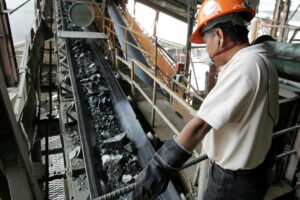By Kyle Aristophere T. Atienza, Reporter
THE PHILIPPINE government wants to incentivize companies that will process critical minerals needed for the country’s green transition, according to the chief of the Department of Environment and Natural Resources (DENR).
At the same time, President Ferdinand R. Marcos, Jr. urged the Senate to pass a bill that seeks to impose margin-based royalties and a windfall profit tax on mining companies, more than a year after it was approved by the House of Representatives.
The Department of Trade and Industry (DTI) is geared “towards incentivizing processing because that’s what will enable us to be a participant in the electric vehicle (EV) market,” Environment Secretary Maria Antonia Yulo-Loyzaga told BusinessWorld on the sidelines of a mining event at the presidential palace on Wednesday.
She said her agency is working with the DTI and several other agencies to harness the potential of the mineral industry, consistent with the country goal of manufacturing EVs and other green technologies.
“We need to establish what is critical to us in order to move the mining industry forward,” Ms. Loyzaga said.
“For the EV push, what do we need and what materials do we have for our own consumption?” she asked, adding that the government also wants to identify the volume of raw minerals that it could export.
At a press briefing later in the day, Ms. Loyzaga said the DENR is working with the DTI in “promoting investments in mineral processing.”
She said potential incentives could cover the processing of nickel which is needed for clean energy technologies, and copper, which is key to making EV batteries. She did not say what types of incentives these will be.
“We always talk about critical minerals, but it’s important that we identify what is critical for us,” she said.
“We must first look at what our needs are, in terms of our energy transition and the other needs in terms of our own infrastructure development to establish what our critical minerals are,” she added.
She said the shift to digitalization is also driving the demand for minerals.
‘SOCIAL GOODS’The Chamber of Mines of the Philippines expressed support for the incentive plan, but said fundamental problems “that ail our industry should first be solved” before “we take the leap to value-added mineral processing.”
“Only then can we be able to produce enough minerals to feed the mineral processing facilities we aspire to build,” Chairman Michael T. Toledo said in a Viber message.
“We have discussed these problems — among them long-term policy consistency, the long and complex approval process of exploration permits and mineral agreement applications, and tax uncertainties — with our top government officials and given our recommendations,” he said.
“[We are] hopeful that we will see positive developments soon to give the Philippines the opportunity to participate in a significant manner in the production of renewable energy technology products in response to climate change,” he added.
Dante R. Bravo, President of Global Ferronickel Holdings, Inc. (FNI), said the mining sector “really needs clarity in terms of incentives for mineral processing.” “The same should be competitive given the size of investments required,” he said in a Viber message.
“For FNI, those incentives would be encouraging to our potential partners in mineral processing.”
Mr. Marcos cited the need to add value to critical materials through “mineral processing,” noting the surging demand for materials needed as the world transitions to clean energy.
“We want to see more investments in processing plants, creating more jobs and contributing more directly to local economies,” he said in a speech at the mining event.
He urged legislators to support the proposed rationalization of the country’s mining fiscal regime.
Under the House version of the bill, large-scale metallic mining operations within mineral reservations will be subject to a 4% royalty tax on the gross output of minerals or mineral products extracted — lower than the 5% recommended by the Finance department.
“This crucial bill, which I highlighted in my 2023 state of the nation address, is fundamental to creating a fair and equitable mining environment for everyone involved,” Mr. Marcos said.
He also sought new methods of mineral processing to reduce waste and energy consumption.
At the briefing, Ms. Loyzaga said the DENR is streamlining the permitting process for mining activities “while not losing the comprehensive analysis that needs to be done when we take a look at what is being permitted in terms of extraction.”
Ms. Loyzaga noted that while the mining sector only accounts for 0.5% of the country’s economic output, it is critical in achieving its infrastructure and green ambitions.
“We are looking at the potential for what we need as a country in order to be on the kind of infrastructure trajectory that we need to develop,” she said.
“We’re also looking at what sort of minerals are needed for the transition to renewable energy,” she said. “It’s not black or white. You have to contextualize what the country needs in terms of development — how we can mitigate these environmental impacts and how we can deliver the social goods.”
